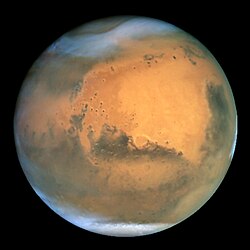NASA readies Mars lander for launch
Tuesday, July 10, 2007

Image: NASA, The Hubble Heritage Team.
NASA technicians are beginning final launch preparations on the Phoenix Mars Lander spacecraft destined for the planet Mars. The unmanned spacecraft is scheduled to launch from Cape Canaveral Air Force Station on Florida's east coast on August 3, at around 5:35 a.m. EST (9.35 UTC). Phoenix will land in the Red Planet's northern polar region to search for signs of life, and analyze the Martian climate from a polar perspective.
The launch period for Phoenix extends from August 3, 2007 until August 24, 2007 and consists of two launch windows per day. A Delta II rocket will carry the spacecraft into Earth's orbit to begin its 122 million mile journey to Mars.
The journey is expected to last about 9 months, ending around May 28 at a landing site called Vastitas Borealis in the northern Arctic plains region of Mars. The site was identified in 2002 by the Mars Odyssey orbiter as having large amounts of water ice just below the surface. The high concentration is necessary to ensure that Phoenix will find water ice within reach of its instruments after landing.
Phoenix will remain on the surface of Mars for about 92 Earth days examining the water ice expected to lie a few inches beneath the rocky surface. The lander contains instruments that will help scientists to determine if life as we know it has ever existed, or currently exists, on this barren planet. The lander will study the atmosphere, surface and subsurface to determine if the Martian Arctic soil could have ever supported life. A detailed analysis of the weather will help scientists determine the Martian climate as well as aid in planning future un-manned and eventually manned missions to our planetary neighbor.
Related news
- "Canada contributes weather station to NASA Mars mission" — Wikinews, April 14, 2007
Sources
- "NASA Readies Mars Lander for August Launch to Icy Site" — NASA, July 9, 2007
- "Phoenix Launch Press Kit" — NASA, July 5, 2007
External links